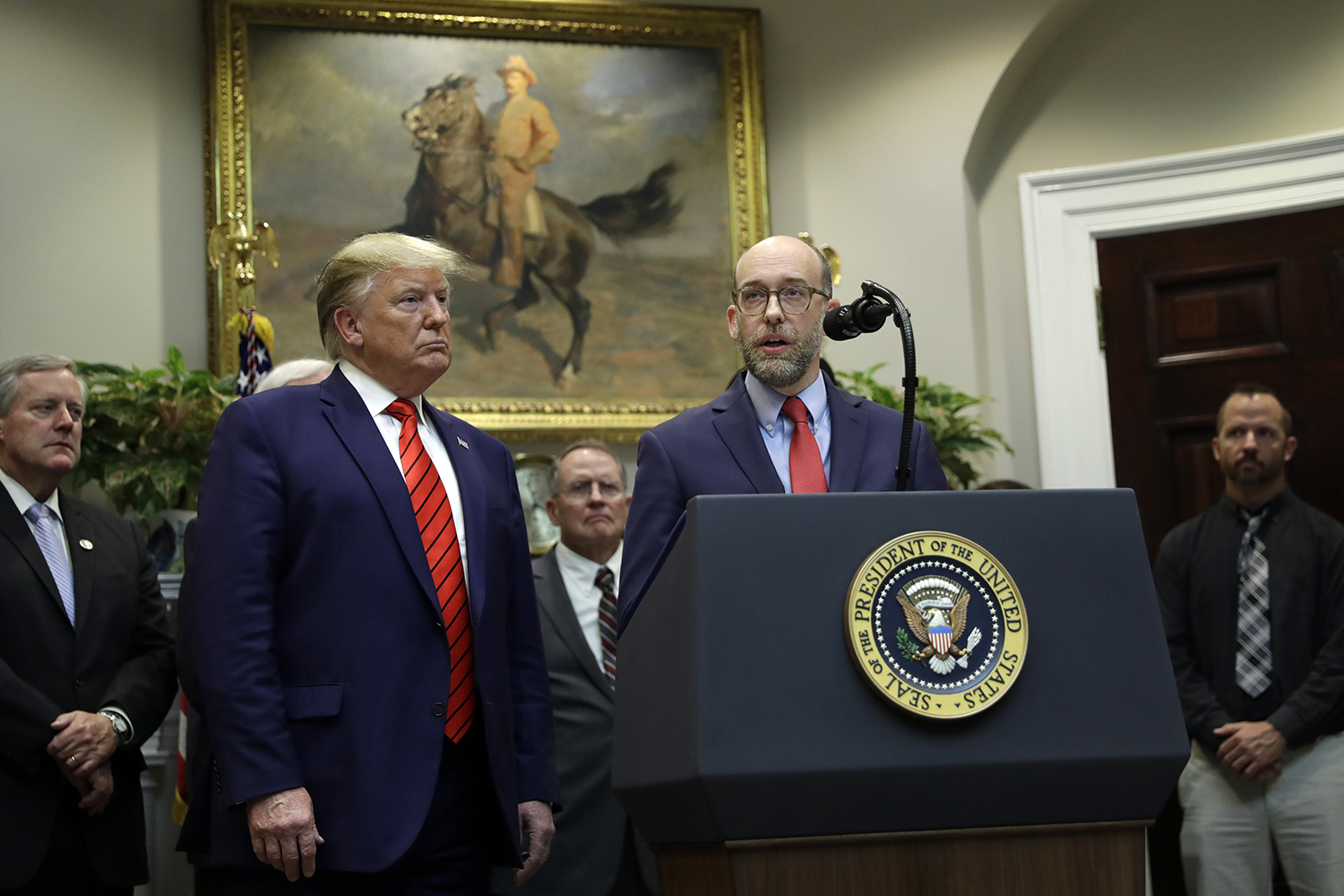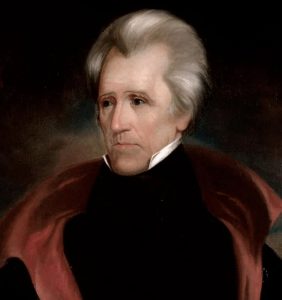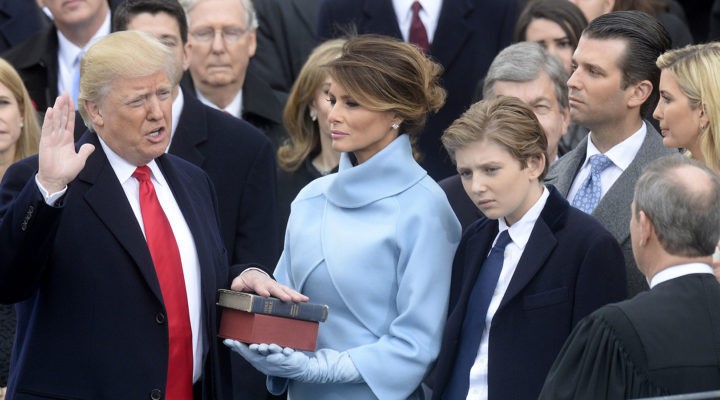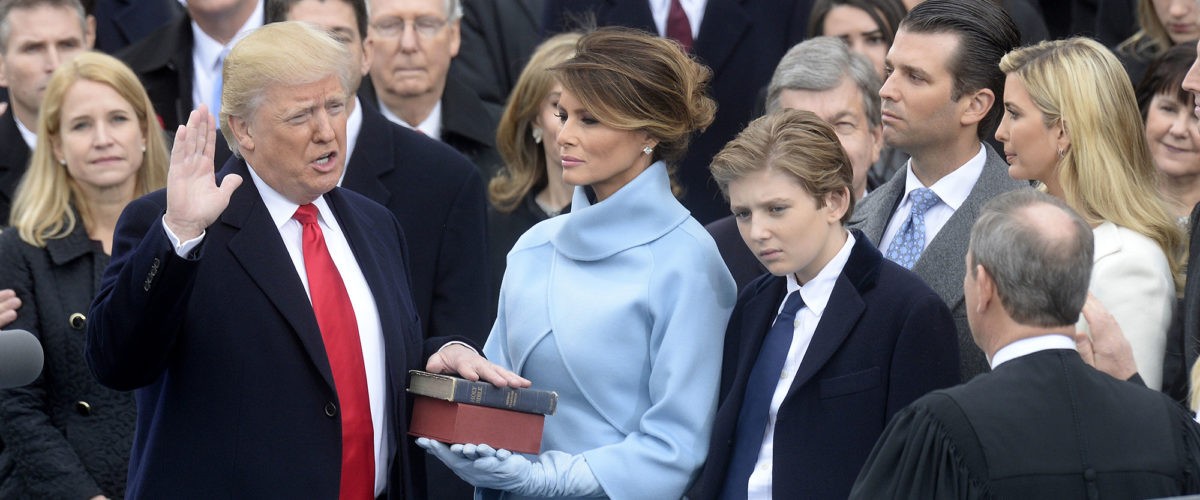Once the party of “law and order,” the Republican Party now enthusiastically supports convicted felon Donald Trump, seeing him as a victim of political persecution rather than facing justice for his crimes.
House Speaker Mike Johnson has called on the U.S. Supreme Court to intervene on Trump’s behalf and reverse the ruling of the New York State Supreme Court. While such a deus ex machina maneuver is beyond the jurisdiction of the nation’s highest judicial authority, the presence of several MAGA-sympathetic justices on the bench means nothing is off the table.
Trump claims once again that only he can fix the broken judiciary and executive branches of government. But the presidency also is his path to avoiding further prosecution.
What would the government — and America more broadly — look like under an indicted president trying to outrun the law he’s sworn to uphold?

Formal group photograph of the Supreme Court as it was been comprised on June 30, 2022, after Justice Ketanji Brown Jackson joined the Court. The Justices are posed in front of red velvet drapes and arranged by seniority, with five seated and four standing. Seated from left are Justices Sonia Sotomayor, Clarence Thomas, Chief Justice John G. Roberts, Jr., and Justices Samuel A. Alito and Elena Kagan. Standing from left are Justices Amy Coney Barrett, Neil M. Gorsuch, Brett M. Kavanaugh, and Ketanji Brown Jackson. (Fred Schilling, Collection of the Supreme Court of the United States)
Supreme Court appointments
During his first term in office, Trump appointed three justices to the Supreme Court: Neil M. Gorsuch, Brett M. Kavanaugh and Amy Coney Barrett. A second term could give him opportunity to appoint at least two more. Should Trump win in November, court watchers predict Clarence Thomas, age 75, and Samuel A. Alito Jr., age 73, would retire to make room for their younger, more radical replacements. While the overall conservative composition of the court would not change, if Trump appointed justices in their fifties, as he did during his first term, SCOTUS would retain its conservative dominance for decades.
Before each prior election, Trump released a list of his possible nominees for SCOTUS to reassure voters of his conservative credentials. In 2016, those who rated the court as a top priority provided Trump with the margin of victory he needed to win the presidency.
The National Review, long a bastion of conservatism, is clamoring for him to compile a list of potential high court picks for 2024. So is Ralph Reed, chairman of the Faith and Freedom Coalition, who believes conservatives still prioritize the court. In March, Trump told the Washington Times, “I’m going to be putting together a list of judges — great judges — a list of about 20.”
This list, however, may not be what traditional conservatives have in mind.
“Trump believes his first appointments have been insufficiently loyal to his personal grievances.”
Trump believes his first appointments have been insufficiently loyal to his personal grievances. The high court’s inability to overturn his recent state felony convictions only has heightened his animosity toward the justices who also refused to hand him the 2020 election, which he lost. This election cycle, Trump is looking for judges willing to support him and the extremist views of his followers.
Possible nominations include several judges from the ultraconservative Fifth Circuit U.S. Court of Appeals, including James Ho, heralded by some as the “next Clarence Thomas” for his conservative opinions and links to Republican megadonor Harlan Crow. His wife, Allyson, has ties to the Alliance Defending Freedom and the Christian nationalist First Liberty Institute.
Another potential fifth circuit nominee is Andrew Oldham, who has spent much of his career clearing the way for anti-immigrant policies and restricting voting rights. He has signaled a willingness to reverse Brown v. Bord of Education which ended school segregation.
Then there’s Kyle Duncan, who has taken aggressive positions against abortion, birth control, same-sex marriage, and trans people. If Trump wins the election, and if Republicans retake control of the Senate, Trump nominees — regardless of how extreme — stand a good chance of being confirmed.
Who’s advising him?
During his first term, Trump looked to Leonard Leo and the Federalist Society for his list of Supreme Court nominees. However, Leo and Trump had a heated falling out in 2020, which opened the door to “New Right” activists whose interpretations of the law are more favorable to Trump.

Mike Davis (screencap)
Leading this pack is Mike Davis, who oversaw the Gorsuch confirmation and served as the Senate Judiciary Committee’s chief nominations counsel during the Kavanaugh nomination process. Davis founded the nonprofit Article III Project, dedicated to placing MAGA judges on the bench. Named after the judiciary section of the Constitution, the organization is responsible for seating 55 federal circuit judges and 13 key federal courts of appeals judges. Davis also started the group Unsilenced Majority to “oppose cancel culture and fight back against the woke mob.”
“We’re gonna put kids in cages. It’s gonna be glorious.”
Mike Davis reportedly is under consideration to become Trump’s next attorney general. In a YouTube interview with Turning Point USA’s Benny Johnson, Davis was enthusiastic about his plans for Trump’s second term. “We’re gonna fire a lot of people in the executive branch and the deep state. … We’re gonna indict Joe Biden and Hunter Biden and James Biden and every other scumball, sleazeball, Biden. … We’re gonna deport a lot of people, 10 million people and growing, anchor babies, their parents, their grandparents. We’re gonna put kids in cages. It’s going to be glorious.”
As Trump’s attorney general, Davis would have the Justice Department at his disposal to orchestrate his horrific vision.
Prosecuting Trump’s opponents
While Biden’s attorney general, Merrick Garland, has gone out of his way to project neutrality and preserve the independence of the DOJ, Davis feels no such compunction. Not only would he gleefully see the federal indictments against Trump dropped, he is more than willing to carry out the prosecution of Trump’s political “enemies,” including Hilary Clinton.
In fact, Trump ordered his previous administration to target Clinton, and only a recusal by then Attorney General Jeff Sessions prevented it. That guardrail, flimsy as it was under Sessions, will be nonexistent in a second Trump administration.
Many other federal departments such as the FBI, the Civil Rights Division and the U.S. Marshals Service also are under the auspices of the DOJ and would be Trump’s to command.
“Trump ordering the prosecution of his opponents would be an epic abuse of power.”
Michael Waldman, president of the Brennan Center for Justice, told The New York Times, “Trump ordering the prosecution of his opponents would be an epic abuse of power. It would revert to a time before Watergate, when presidents used the FBI and IRS to go after perceived enemies and even just partisan opponents.”
But at least in the case of Watergate, Republican party leaders, angered by the depth of Nixon’s corruption, eventually persuaded the president to resign. Today’s Republicans are tripping over one another to defend Trump.
The traditional conservative lawyers who filled the first Trump administration constrained the president’s most controversial orders. Now Stephen Miller, Trump’s former policy adviser and possible next chief of staff, is compiling lists of loyal MAGA lawyers ready to staff a second Trump term. Miller, known for promoting racist and antisemitic conspiracy theories, was responsible for Trump’s Muslim travel ban.
For the last four years, Miller has headed up the America First Legal Foundation, which he describes as the “Right’s long-awaited answer to the American Civil Liberties Union.” With only 10 lawyers on staff, the group has been busy filing complaints with the Equal Employment Opportunity Commission on behalf of white males against “woke corporations” like Disney, Nike, Mattel and the NFL.
America First Legal also has filed lawsuits against school districts in several states for their “radical pro-transgender and pro-gay attitudes.” In Texas, AFL served as outside counsel to Attorney General Ken Paxton in anti-immigration lawsuits against the current Biden DOJ.

President Donald Trump listens as acting director of the Office of Management and Budget Russ Vought speaks during an event on “transparency in federal guidance and enforcement” in the Roosevelt Room of the White House, Wednesday, Oct. 9, 2019, in Washington. (AP Photo/Evan Vucci)
Targeting federal agencies
In addition to the DOJ and the president’s cabinet, there are various other agencies within the executive branch with regulatory and rulemaking power. This includes the Federal Communications Commission, Central Intelligence Agency, Environmental Protection Agency, Federal Election Committee, Federal Reserve, Securities and Exchange Commission, Federal Trade Commission and others. These agencies operate independently of the president — for now.
Russ Vought, Trump’s former head of the Office of Management and Budget who now leads the Center for Renewing America, would like to see these agencies placed under the authority of the president. Vought wrote the chapter on the presidency for the Heritage Foundation’s Project 2025, a blueprint to remake the federal government in Trump’s image.
Last month, Trump and the Republican National Committee appointed Vought director for the 2024 platform committee. He also is a possible candidate for chief of staff in a second Trump term. An unabashed Christian nationalist, Vought believes America is in a “post-Constitutional” age that requires seizing power from the federal bureaucracy and handing it over to the president.
“Vought believes America is in a ‘post-Constitutional’ age that requires seizing power from the federal bureaucracy and handing it over to the president.”
This strong “unitary executive theory” has been around since the Reagan administration and was expanded during the presidency of George W. Bush. Proponents like Vought believe control of the executive branch, and all the agencies within it, are the sole provenance of the president. According to this philosophy, Trump in his second term would be able to fire and replace any head of an executive branch agency who doesn’t carry out his orders. He could order the FCC to rescind the licenses of television networks that criticize him or install FBI agents who are loyal only to him. A Trump-directed EPA would have no qualms about allowing big donors to pollute, and the FTC under direct Trump control would feel pressure to place Trump’s business interests.
Most of the federal bureaucracy is made up of nonpartisan civil servants: accountants, astronauts, scientists, doctors, engineers and other experts who keep the government running from administration to administration and ensure a professional workforce insulated from political partisanship. Yet in October 2020, Trump issued the “Executive Order on Creating Schedule F in the Excepted Service” to reclassify these civil servants as political appointees.
At the time, Rep. Don Beyer (D-Va.), told the Washington Post, “it’s an attempt to redefine the civil service as a political arm of the presidency rather than public servants who work for the American people,” leading to “open cronyism that does not benefit the country, but the president.”
Vought’s OMB planned to replace 88% of its staff under Schedule F.
“Trump could replace as many as 50,000 career civil servants with partisan appointees who will enable his greed and grievances.”
When President Biden began his first term a few months later, he rescinded Schedule F. Fearing a Trump return, the Office of Personnel Management recently issued new rules strengthening protections for civil servants. But these internal regulations may not prevent the reinstitution of Schedule F in a second Trump term if surrogates like Davis, Miller and Vought are determined. Trump could replace as many as 50,000 career civil servants with partisan appointees who will enable his greed and grievances.
Project 2025
Planning for a Trump takeover of the executive branch, Miller’s AFL, Vought’s CRA and more than 100 other right-wing organizations have joined the Heritage Foundation to create the Project 2025 “Presidential Administration Academy.” Designed to educate and train potential Trump staffers, the video “classes” are free and provide a certificate upon completion.
Topics covered include the “History of the Conservative Movement,” “How to Work with the Media,” “How Conservatives Can Win the Regulations Game,” and “Executive Order: Drafting and Implementing.”
Regardless of the subject, the end objective for each lesson is the same: advancing Trump’s agenda.
Sen. J.D. Vance of Ohio, who reportedly is on Trump’s short list for vice president, urged Trump to fire thousands of civil servants, and “when the courts stop you, stand before the country, and say ‘The chief justice has made his ruling. Now let him enforce it.’”

Andrew Jackson (White House portrait)
Vance was quoting Andrew Jackson, who supposedly said the same to Chief Justice John Marshall in 1834. The Supreme Court had sided with the Cherokee Nation in a dispute over land with the state of Georgia. Jackson refused to acknowledge the court’s decision and ignored the executive branch’s legal obligation to keep white settlers off native land. He looked the other way as his cronies mined for gold and his base — white settlers — seized Cherokee land, eventually forcing the tribe’s removal west.
This brand of cronyism, called the “spoils system,” flourished during Jackson’s two terms in office. He appointed six Supreme Court justices to the bench, many of them political allies. The most notorious was Jackson’s attorney general and political ally, Roger Taney, who replaced Marshall as chief justice. Taney oversaw the ruling in Dred Scott v. Sanford, which declared Blacks in America were “beings of inferior order” and “had no rights which the white man was bound to respect.” This decision further fractured the country and sent it spiraling toward a civil war four years later.
Trump, who had a portrait of Andrew Jackson hanging in his Oval Office, doesn’t have to wait for a Supreme Court favorable to his views. Conservatives on the court already have issued decisions restricting the EPA’s ability to limit carbon emissions and rolled back regulations in the Clean Water Act. With their supermajority, they also ended affirmative action and permitted businesses to discriminate against LGBTQ customers. Justice Thomas admits he would like to see the Supreme Court cases allowing for same-sex marriage, gay sex and the right to birth control relitigated. Brown v. Board of Education also is problematic in his eyes.
There are those who say a second Trump term is no cause to worry. It’s only four years, after all. What could go wrong?
But a President Trump who is no longer accountable to voters, who can appoint new judges, tear down the executive branch, punish his enemies, reward his cronies and enrich himself is a terrifying specter.
The effects of another four years of Trump could wreak havoc on our democracy, our nation and our planet for generations to come.
Kristen Thomason is a freelance writer with a background in media studies and production. She has worked with national and international religious organizations and for public television. Currently based in Scotland, she has organized worship arts at churches in Metro D.C. and Toronto. In addition to writing for Baptist News Global, Kristen blogs on matters of faith and social justice at viaexmachina.com.
Related articles:
No crystal ball needed to see a second Trump term: Look at Israel | Analysis by Rodney Kennedy
One thing that must happen in 2024 | Opinion by Mark Wingfield


